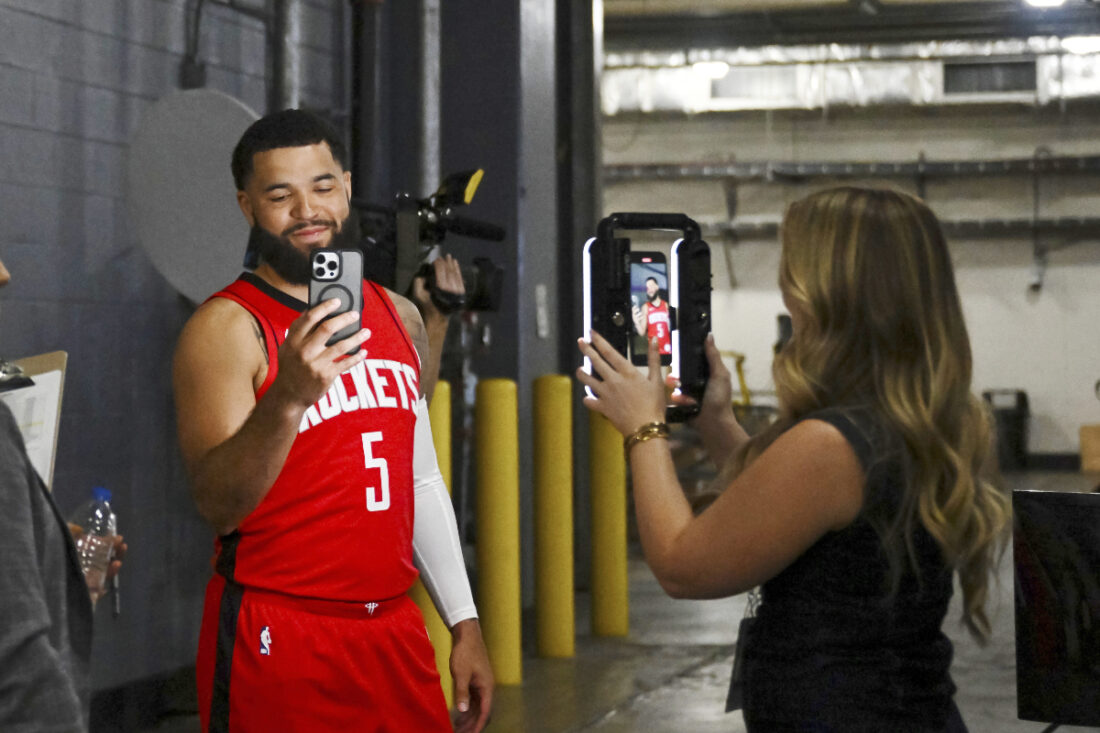Social media echo chambers, debates are rapidly dividing us
Middle-ground reset is desperately needed, before it’s too late

AP Photo: Pro basketball player Fred VanVleet gives a social media update on his phone while being recorded by a reporter who is having her picture taken in the process.
About 30 years ago, I noticed a rapidly-developing trend in sports journalism.
Tired of going the respectful, impartial route in search of professional legitimacy, many writers and on-air radio or television personalities realized the exact opposite approach opened a short-cut window to far bigger audiences and more lucrative opportunities.
Say something — anything — controversial, and it riled up the masses. Did they even personally believe it themselves? Didn’t matter. Go bold and go loud or go home.
The era of the sports “shock jock” — a concept initially introduced to the mainstream by Howard Stern and his ilk a few years earlier — was born.
The internet and message boards soon followed. Smart phones. Social media. Access to the opinions of everything and everyone, 24 hours a day, seven days a week.
Politicians and political commentary, of course, veered in a similar direction. Again, it wasn’t even necessarily about maintaining neutrality or even a certain standard. That was “boring” and old school. Talking heads and columnists got much more reactionary and inflammatory. The goal was to keep the entire audience engaged. Supporters for legitimacy; detractors for clicks and ratings.
The lines between sports or politics and entertainment inevitably blurred. Everything was a game for financial gain.
So here we are. Log in to a social media account, and you’re immediately inundated with opinions from nearly everyone. The more attention and recognition, the better the numbers. And that often comes from being as contentious and goading as possible. From the “hot take” world of sports and politics, down to your friends, family members and neighbors.
The problem? We’re now in this repetitive loop of unintended psychological warfare — both on each other, and more importantly, ourselves. No one is really sitting down and having face-to-face conversations with civil dialogue. No one stops and takes much time to reflect on ramifications or feelings anymore before they post or share. No one spends much time thinking or working from a different perspective than their own.
Our society is riddled with “shock jocks” now. And despite actually having so much in common away from our screens, our world has lost most of its nuance — the in-between that keeps us from succumbing to outright hate and division. The self-fulfilling prophecies, sadly, could very well be next.
I say all of this not to scold or lecture from a makeshift pulpit. I’m only adding to the problem if I sit in judgement of others without telling stories of my own shortcomings.
This is a sports space, so I’ll use my experiences there as an example. I’ve said here before that I used to regularly read and post on message boards. It was ostensibly social media before social media.
For years, I often let virtual arguments impact me in negative ways. Sometimes, it stemmed from going rounds with rival fans. Sometimes, it came from online conversations with allies (i.e., philosophical differences over a coach, player or gameplan).
Even when I was consciously trying to be positive or optimistic, I’d get dragged down through the process of trying to convince a total stranger to believe what I was believing.
It took a lot of time and self-reflection to realize I wasn’t getting anywhere. I was carrying the weight of my own expectations and interests, while also trying to lift or even change the emotions of others — almost always unsuccessfully, which made me even more frustrated and cynical.
That burden of online battling is a lot like what we are seeing today on both sides and across all platforms. Instead of protecting our own peace, we often voluntarily surrender it.
We cannot, collectively as a society, pass that point of potentially no return when it comes to this. We have to be better about agreeing to disagree, accepting and finding commonalities in a civil fashion, and not personally absorbing the crushing pressure of someone else’s anger or hate. It’s too much. You won’t win. In fact, you could lose touch with reality and your sanity in the process.
The “shock jock” knows how to play the game. They’re often pushing all the right buttons to stay relevant and rally the troops either vehemently for or staunchly against their point of view.
They’re everywhere now. We could all name a few from our own respective walks of life, from famous figures to local regulars you love to hate.
The best way to extinguish this behavior — and regain our collective sense of normalcy — is to know when to move on. Let it go. Be the bigger person. Choose your emotional investments wisely. Rid yourself of the effort and space the “opposition” often occupies rent-free in your mind.
Bad actors on social media only gain strength and reach if we allow their perception to become our reality. The ball is still in our court. We can simply walk away if need be.
For the sake of everything around you, make a more conscious choice to get any hate you harbor out of your heart. Don’t let the world’s “shock jocks” rob you of your happiness — or balance.
If we can’t let certain things go and meet in the middle, there will be no middle left to reside. And a world without common ground means we all lose in the end.
Eric Pratt is Sports Editor at The Messenger. Contact him via email at sports@messengernews.net, or on Twitter @ByEricPratt




